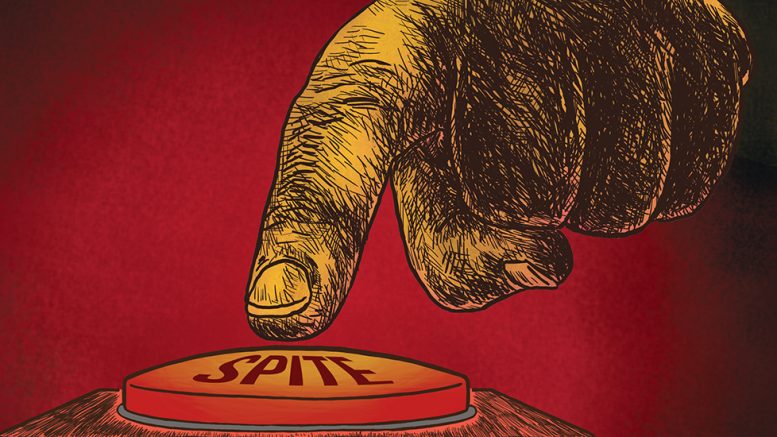If student politics is the training ground for parliamentary politics, then legislatures across Canada increasingly look like the schoolyards of the nation.
A motion effectively summoned by the whim of the UMSU executive – formally forwarded by councillor Arthur Cole Reis and approved by the ever-servile UMSU council – has set into motion a non-binding plebiscite posing the existential question: “Do you believe UMSU should remain a member of the Canadian Federation of Students, at a cost of $14.98 per student per year?”
The likely causes for the referendum are varied but identically vacuous in nature. First, there was the 2013-14 UMSU executive that tore promotional CFS material from UMSU agendas following a dispute surrounding printing costs. The executives deemed the deal unfit to “provide the cheapest and best service for our students,” a retroactive negotiating strategy worthy of recounting in a number-one bestseller. Perhaps, UMSU: The Art of the Deal?
Second was the protracted 2013-14 UMSU executive decision to withhold a total of $993,562.18 in annual membership fees to CFS, all due to an argument over which organization had the legitimate rights to an UMSU domain name. The million-dollar drama came to an end in mid-2016 after UMSU settled its debt to CFS – an easily accomplished task as the union continued to collect the CFS levy from students throughout the years.
Third was UMSU president Tanjit Nagra’s executive experience at a 2016 CFS national general meeting. There, Nagra claims to have been verbally harassed by a dual executive of the U of W students’ association and CFS-Manitoba, as well as laughed at by the national CFS executives.
In the aftermath, UMSU council passed an emergency motion mandating its executives pen a letter demanding an apology from CFS. In written response, CFS took two pages to explain that anti-harassment measures were amply offered to UMSU, whereby no official complaints were lodged. The message conspicuously lacked an apology for the alleged harassment.
UMSU considered the letter from CFS both inaccurate and insufficient.
With this triad of trite events in mind, it is clear UMSU’s proposed plebiscite is only a means of turning the pettily personal into the political. Fraught with tension for years, the relationship between UMSU and CFS is brittle in trepidation for precisely the kind of play the current union leadership and its accessory council are trying to pull off.
By advancing the plebiscite, executives may guise their action as an innocent appeal for students to carve out a mandate for the future of the union’s relationship with CFS. Yet spinning the story this way conveniently neglects the fact that UMSU hasn’t held a democratic mandate for decades – save the 2017-18 election, less than a quarter of students have voted in annual UMSU elections for the past 20 years.
Far from procuring an emboldened statement, asking for popular opinion on CFS membership will go unnoticed in the wind, with the executives maybe receiving a few whispers in their ears from the probable 10 to 20 per cent that do take a position in the plebiscite.
To anyone with the strength of will to watch, UMSU is clearly setting the stage for a defederation campaign. It is a sorry state of affairs when the prime of student politics is its capacity to pass as a matinee drama in the cheap seats. Yet in what is clearly an attempt to make an example of CFS for the application resumés of future parliamentarians, the UMSU executive has appeared to set up its current “constituents” for failure.
Frankly, UMSU’s current course of action is one of self-refutation. The logic of institutional lobbying is to enshrine certain group interests in legislation. As the member of a national organization like the CFS, UMSU increases the structural bargaining power of students by backing students’ interests with a plurality of united unions as opposed to a plurality of lone unions. When pursuing talks with the federal government, UMSU is better off with more committed allies than fewer.
Although UMSU has claimed success in opening channels of communication to the federal government with other U15 research universities, such casual collaboration is no proper substitute for the activist infrastructure offered by CFS, along with its massive organizing and mobilizing apparatus.
In the language of practical realpolitik, as student politicians seem so fond of speaking, lobbying ultimately breaks down into a numbers game or a favours game: who backs whom, and who can do favours for whom. CFS has the resources to grapple in both arenas.
In desertion of the federation, student lobbying power is weakened by splintering the student voice into antagonistic factions. A sad situation, but arguably a political necessity in certain scenarios. Yet UMSU’s interests here are not formally political – they take the character of righteous revenge. Having been wronged, UMSU is now preparing for retaliation. While this moment of political theatre may be one worthy of laughter by its victors over dimly lit bar tables long into the future, it will do little to avail the fight for free tuition, increasing the quality of academic work at our universities, and building stronger student supports on campus.
But since when has UMSU been concerned with any of that?



